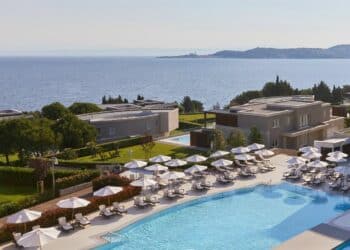 Rotana, one of the leading hotel management companies in the region with over 100 properties across the Middle East, Africa, Eastern Europe, and Türkiye (MENAT), has entered into a partnership with Chef’s Eye, an intuitive food-waste measurement technology, to help reduce its carbon footprint.
Rotana, one of the leading hotel management companies in the region with over 100 properties across the Middle East, Africa, Eastern Europe, and Türkiye (MENAT), has entered into a partnership with Chef’s Eye, an intuitive food-waste measurement technology, to help reduce its carbon footprint.
Implemented across Rotana’s properties in the UAE at the end of 2023, the innovative project is spearheaded by Jarrett Beaulieu, Vice President of Food and Beverage at Rotana. First quarter results for 2024 indicate that Chef’s Eye has enabled Rotana to reduce its carbon emissions by 41,245.93kg (equivalent to charging over 2.7 million smartphones or powering 10 gasoline passenger vehicles for a full year). In addition, food waste has been reduced by an average of 25 grams per cover. This includes a 22 percent reduction in overall production or trim waste, as well as a 15% reduction in food waste from buffet stations, and a staggering 63 percent reduction in food waste from plated meals.
“The introduction of Chef’s Eye novel technology to our operations highlights Rotana’s commitment to sustainable business practices. When food is wasted, every resource that goes into the production of the food, such as water and energy, both of which produce greenhouse gasses, is also wasted. Not only do these wasted resources increase our carbon footprint, but the food that ends up in landfills also produces methane, further contributing to our carbon footprint. That is why curbing food waste is a key objective for achieving Rotana’s overall sustainability goals,” explains Beaulieu.
Data indicates that an average hotel in the UAE produces one tonne of food waste per week. With the help of Chef’s Eye, Rotana is able to segment this into manageable categories – production waste, buffet waste, and trim waste – to better manage waste with clear data and concise actions.
Chef’s Eye’s technology allows Rotana chefs to identify and map out specific dishes and ingredients that are wasted with the use of a camera and scales. The information can then be analysed to allow critical changes to be actioned effectively.
As such, Chef’s Eye helps to cut down on both food waste and operational costs, and contributes to more effective menu development and efficiency in the kitchen. For instance, by identifying the volume of production waste from poor prep work chefs can pinpoint training needs within their kitchen.
Buffet waste is another food waste category many hotels grapple with. At Rotana, Chef’s Eye has helped reduce this waste category by identifying patterns within certain dishes and food groups that tend to be wasted due to overproduction or popularity. In addition, Rotana has also introduced smaller plates and serving spoons in Flavours and Horizon restaurants to promote mindful dining. These actions all contribute to Rotana’s ongoing efforts in sustainable dining.
Rotana has also introduced several other initiatives across its regional properties to reduce its carbon footprint, including the reduction of single-use plastics, the launch of bottling rooms across Rotana properties to bottle filtered water, and the introduction of a sustainable, locally sourced breakfast offering at its UAE hotels.
Further signalling its commitment to sustainability, Rotana also signed an agreement with the National Food Loss and Waste Initiative, Ne’ma, to embrace food loss and waste reduction as a top priority, in alignment with the UAE’s aim to cut food loss and waste by 50% by 2030.
Rotana currently operates 76 hotels in the Middle East, Africa, Eastern Europe, and Türkiye, serving more than six million guests per year. Its portfolio currently spans 19,761 keys and six superlative brands, including an impressive 10,276 keys across 35 hotels in the UAE and 2,316 keys across nine hotels in The Kingdom of Saudi Arabia.


































































